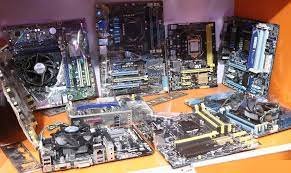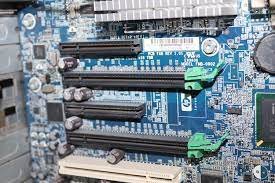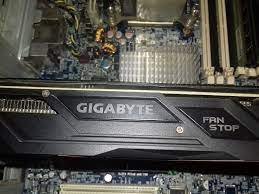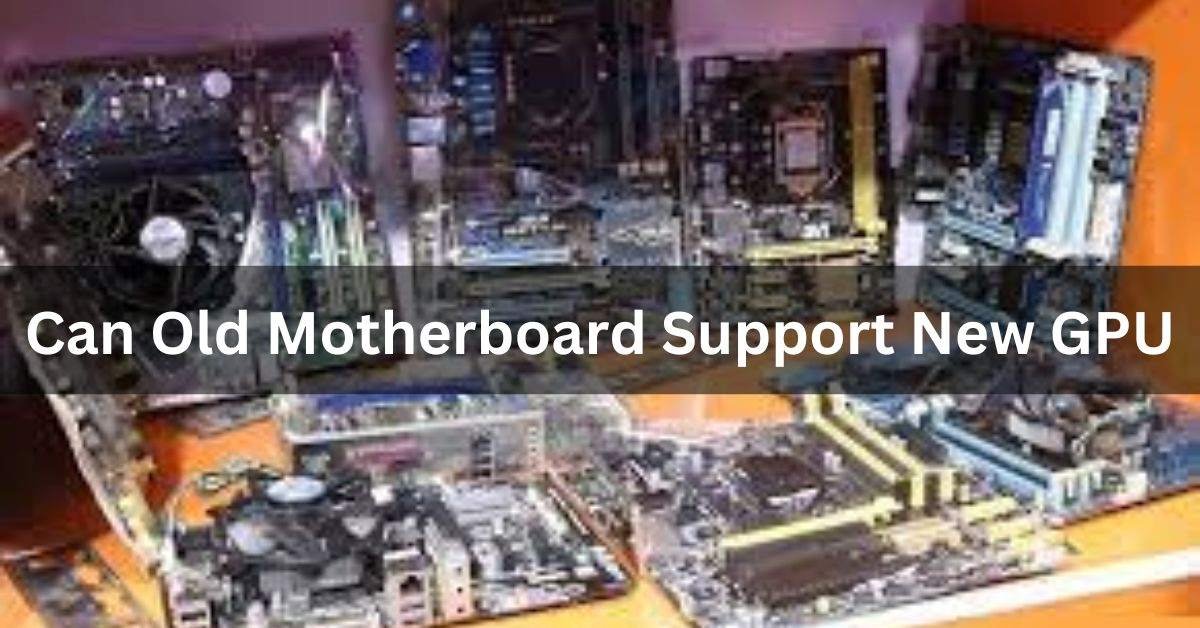Upgrading your graphics card (GPU) is a common practice among gamers and PC enthusiasts to enhance gaming and graphical performance. However, many users often wonder if their old motherboard can support a new GPU.
No, the Old motherboard may not support the new GPU due to compatibility issues. Check motherboard specifications and GPU requirements to ensure compatibility before upgrading.
In this article, we will discuss “Can Old Motherboard Support New GPU ” and also discuss the Compatibility of the motherboard.
Understanding Motherboard Compatibility:
When assessing whether an old motherboard can support a new GPU, several factors come into play. Motherboard compatibility depends on various components such as the motherboard’s chipset, PCIe slot version, power supply unit (PSU) capacity, and BIOS support.
Read: Asrock Motherboard Wifi Not Working - Complete Guide - 2024
What is a motherboard?
A motherboard is the main circuit board of a computer system, providing the platform for other components to connect and communicate with each other. It houses the CPU, RAM, storage drives, and expansion slots for peripherals like GPUs.
Read: Should I Connect HDMI to GPU or Motherboard – Complete Guide!
What is a GPU?
A Graphics Processing Unit (GPU) is a specialized electronic circuit designed to accelerate the creation of images in a frame buffer for output to a display device. GPUs are crucial for gaming, video editing, and other graphics-intensive tasks.
GPU Compatibility with Old Motherboards:

Older motherboards may face challenges when attempting to support newer GPUs due to technological advancements and changes in hardware specifications. Compatibility issues can arise regarding PCIe slot versions, power requirements, and BIOS limitations.
Read: Is Streaming CPU Or GPU Intensive – Ultimate Guide – 2024
Considerations for Upgrading GPU:
Before upgrading to a new GPU, it’s essential to evaluate several factors. Consider the power requirements of the new GPU, compatibility with the existing system components, and the potential need for additional upgrades such as a higher wattage PSU.
Read: Do Motherboards Have SD Card Slot – Ultimate Guide – 2024
Testing Compatibility:
To determine compatibility between an old motherboard and a new GPU, users can utilize various methods and tools.
Testing compatibility involves examining the motherboard’s specifications, checking GPU requirements, and using online resources or compatibility checkers.
Read: Can You Use ECC Ram In Non ECC Motherboard – Ultimate Guide – 2024
Overcoming Compatibility Issues:
In cases where compatibility issues arise, there are steps that users can take to address them. Updating the motherboard’s BIOS to the latest version and installing compatible drivers for the new GPU can help resolve compatibility issues and ensure smooth operation.
Read: Green Light Motherboard – Complete Guide – 2024
Future-Proofing Your System:
When considering upgrades to your system, it’s essential to plan for future compatibility. Opting for a motherboard with ample expansion slots and support for the latest technologies can help future-proof your system and accommodate future upgrades seamlessly.
Read: Is Asrock A Good Motherboard – Complete Guide – 2024
Factors for GPU-motherboard compatibility:
When considering GPU-motherboard compatibility, several factors play crucial roles:
1. PCIe Slot Compatibility:
Most GPUs use PCIe (Peripheral Component Interconnect Express) slots on motherboards. Ensure that your motherboard has a compatible PCIe slot for your GPU. Common types include PCIe 3.0 and PCIe 4.0. The physical size of the slot (x16, x8, x4) is also important.
Read: Do Motherboards Come with Standoffs – Ultimate Guide – 2024
2. Power Supply Connectors:
Modern GPUs require dedicated power from the power supply unit (PSU). Ensure that your PSU has the necessary power connectors (usually 6-pin or 8-pin PCIe connectors) to power the GPU. Additionally, check the PSU’s wattage to ensure it can handle the GPU’s power requirements.
Read: Ram Light On Motherboard – Comprehensive Guide – 2024
3. Form Factor:
Ensure that your GPU physically fits inside your computer case and aligns with the motherboard’s form factor. Common form factors include ATX, Micro-ATX, and Mini-ITX.
4. Driver and BIOS Support:
Ensure that your motherboard’s BIOS supports the GPU you intend to install. Additionally, check for driver compatibility to ensure smooth operation.
Read: Asus motherboard orange light – Complete Guide – 2024
5. Thermal Considerations:
High-end GPUs generate a significant amount of heat during operation. Ensure that your motherboard has sufficient cooling solutions, such as fan headers and adequate airflow in the case, to keep the GPU temperatures within safe limits.
Read: Green Light Motherboard – Complete Guide – 2024
What if GPU is not compatible with motherboard?
If the GPU is not compatible with the motherboard, it won’t fit or function properly. You might experience issues like the GPU not being recognized or the system failing to boot. It’s crucial to ensure compatibility before attempting installation.
Read: What Is Backplate Motherboard - Ultimate Guide - 2024
How Can Old Motherboard Support New GPU?
An old motherboard can support a new GPU if the motherboard’s slot (like PCIe) matches the GPU’s slot and the motherboard can provide enough power to the GPU.
Read: Is 85 C Hot For GPU – Comprehensive Guide – 2024
Can Any Motherboard Support Any GPU?
No, not every motherboard can support every GPU. Compatibility depends on factors like the motherboard’s slot type (e.g., PCIe) and whether it can provide enough power for the GPU.
Read: Asus Motherboard Yellow Light – Ultimate Guide – 2024
Can A Motherboard Break A GPU?
Yes, a motherboard can break a GPU if it fails to supply adequate power if the GPU slot is damaged, or if there are compatibility issues. Proper installation and maintenance are crucial.
Read: Motherboard Yellow Light – Complete Guide – 2024
Can You Use a New GPU On an Old Motherboard?

Yes, you can use a new GPU on an old motherboard as long as the motherboard has a compatible slot (such as PCIe) and sufficient power supply capabilities.
Read: Do Motherboards Have Bluetooth – Ultimate Guide – 2024
How Can You Tell If a GPU and a Motherboard Are Compatible?
You can tell if a GPU and motherboard are compatible by checking if the GPU’s slot matches the motherboard’s slot (e.g., PCIe), and if the motherboard supports the GPU’s power requirements and size.
Read: Orange Motherboard Light – Complete Guide – 2024
Can You Put Any GPU In Any Motherboard?
No, you cannot put any GPU in any motherboard. Compatibility matters. The GPU needs to fit the motherboard’s slot (like PCIe) and the motherboard should support the GPU’s power requirements.
Read: Are All Motherboards The Same Size – Ultimate Guide – 2024
Can a Graphics Card Be Too Powerful For a Motherboard?
Yes, a graphics card can be too powerful for a motherboard if the motherboard’s components, such as the PCIe slot and power supply, cannot handle the demands of the graphics card.
Read: Is All Ram Compatible With All Motherboards – Complete Guide
Can a Graphics Card Damage a Motherboard?
Yes, a graphics card can damage a motherboard if it draws too much power or if it’s not properly installed. Ensure compatibility and follow installation instructions carefully to avoid damage.
Read: New Motherboard Wifi Not Working – Ultimate Guide – 2024
Should I Install New GPU in Old Motherboard?
Yes, you can install a new GPU in an old motherboard as long as the GPU’s slot matches the motherboard’s slot and the power supply is sufficient.
New GPU on A Very Old Motherboard Will It Run?
Running a new GPU on a very old motherboard might not work due to compatibility issues with outdated slots or insufficient power. Check the GPU and motherboard specifications for compatibility before attempting.
Running New Video Card With Older Motherboard?
You can run a new video card with an older motherboard if it has compatible slots like PCIe. Ensure the motherboard’s power supply and BIOS support the new card for compatibility.
Can new GPU run on old motherboard?
Yes, a new GPU can run on an old motherboard as long as the motherboard has a compatible slot (like PCIe) for the GPU. However, check compatibility and power supply requirements to ensure smooth functioning.
Do you need a new motherboard for a new GPU?
No, you don’t necessarily need a new motherboard for a new GPU. As long as your motherboard has a compatible slot (like PCIe) and meets power requirements, you can typically upgrade your GPU without replacing the motherboard.
Can an old PC handle a new graphics card?
Yes, an old PC can handle a new graphics card if it meets certain requirements. Check if the PC’s power supply is sufficient and if it has a compatible slot (like PCIe). Sometimes, you may need to update drivers or BIOS.
Does the motherboard matter for GPU?
Yes, the motherboard matters for the GPU. It needs to have a compatible slot (like PCIe) for the GPU to fit. Additionally, ensuring the motherboard’s power supply can support the GPU is important for smooth operation.
Will an old graphics card work with a new motherboard?
Yes, an old graphics card can work with a new motherboard if the motherboard has a compatible slot (like PCIe) and the necessary power connectors. Ensure drivers are updated for optimal compatibility.
Read: B550 Gaming Plus CPU Light On – Comprehensive Guide – 2024
Can an old GPU be incompatible with newer motherboards?
Yes, an old GPU can be incompatible with newer motherboards if they use different connection standards or lack necessary drivers. Check compatibility by ensuring the motherboard has a slot (like PCIe) that fits the GPU and supports its requirements.
Read: White Light On Motherboard - Ultimate Guide - 2024
Do desktop motherboards support almost any graphics card?
Yes, most desktop motherboards support almost any graphics card, as long as the card fits into a compatible slot (like PCIe) and the motherboard can supply sufficient power. Checking compatibility and available slots is important for smooth installation.
Can I put any graphics card in a DDR2 motherboard?
No, you cannot put any graphics card in a DDR2 motherboard. Graphics card compatibility depends on the motherboard’s slot type, like PCIe.
DDR2 refers to the type of memory used by the motherboard and does not determine graphics card compatibility.
Read: Is 70c Hot For A CPU – Comprehensive Guide – 2024
Can an old computer hundle a new graphics card?
Yes, an old computer can handle a new graphics card if the motherboard has a compatible slot and the power supply can support it. However, ensure that other components like the CPU and RAM are not bottlenecking performance.
Read: What Graphics Cards Are Compatible With My Motherboard – Complete Guide!
Will old motherboard work with new GPU?
The old motherboard may work with a new GPU if it has compatible expansion slots (like PCIe). Ensure the motherboard’s power supply and BIOS can support the new GPU for compatibility.
Read: Can You Use 8 Pin 4 Pin Motherboard – Complete Guide – 2024
Can i use new graphics cards on an old motherboard?
Yes, it’s possible but not always guaranteed. Compatibility depends on factors like the motherboard’s slot type and power supply. Newer graphics cards may require specific connections or newer motherboard models.
Read: Do Motherboards Come With Screws – Ultimate Guide – 2024
Can Old Motherboard Support New CPU?
No, Old motherboards might not support new CPUs due to differences in socket types, power requirements, or BIOS compatibility. Check motherboard specifications before upgrading the CPU to ensure compatibility.
Read: Do Motherboards Come With Bluetooth – Complete Guide – 2024!
Are new graphics cards compatible with older motherboards?
Yes, sometimes. It varies based on the motherboard’s compatibility with the graphics card’s specifications. Older motherboards may not support newer graphics cards due to different interfaces or power requirements.
Read: Can Motherboards Bottleneck – The Ultimate Guide of 2024!
Do I need a new motherboard for a new GPU?
No, not always. It depends on compatibility. Some new GPUs might need a newer motherboard with specific slots or power connections, but older ones may work fine.
Read: Are Gigabyte Motherboards Good – Ultimate Guide – 2024
How do I know if my motherboard can handle a new graphics card?
To know if your motherboard can handle a new graphics card, check its PCIe slot compatibility, power supply capacity, and BIOS support. Refer to the motherboard’s specifications or manual for details.
Read: Are Asrock Motherboards Good – Complete Guide of 2024!
Can an old motherboard damage a new GPU?

Yes, an old motherboard can potentially damage a new GPU if it lacks proper power delivery or compatibility features. Ensure compatibility and sufficient power before installing a new GPU.
Read: How Long Does A Motherboard Last – Complete Guide – 2024
FAQs:
1. Is there any GPU card limitation for an old motherboard?
Yes, old motherboards may have limitations on GPU cards due to outdated PCIe slot versions, power supply capacities, and BIOS support. Check your motherboard’s specifications for compatibility before purchasing a GPU card.
2. How do I determine if a given GPU is compatible with some motherboard?
To determine GPU compatibility with a motherboard, check if the motherboard has the necessary PCIe slots and supports the GPU’s interface (e.g., PCIe 3.0). Verify power requirements and driver compatibility too.
3. Can you use an old GPU with a new motherboard?
Yes, you can use an old GPU with a new motherboard if they have compatible interfaces (like PCIe), but compatibility issues may arise due to driver support or power requirements.
4. Is it possible to have compatibility issues with old GPU and new motherboards?
Yes, it’s possible to have compatibility issues with old GPUs and new motherboards due to differences in interfaces, power requirements, and driver support. Always check compatibility before upgrading or building a system.
5. Can a GPU be incompatible with a motherboard?
Yes, a GPU can be incompatible with a motherboard if the motherboard lacks the necessary slot or doesn’t support the GPU’s interface or power requirements. Always check compatibility before purchasing.
6. Can I use any graphics card with any motherboard?
Yes, usually you can use any graphics card with any motherboard as long as they have compatible slots. Check the motherboard’s specifications to ensure compatibility.
7. Will an old motherboard have a problem with a newer GPU?
An old motherboard may have compatibility issues with a newer GPU due to differences in technology and connectors. It’s important to check compatibility before upgrading your graphics card.
8. What factor limits which GPU cards can I install on my motherboard?
The main factor limiting GPU compatibility with your motherboard is the type of PCIe slot it has. Newer GPUs may require PCIe 3.0 or higher slots, while older ones may use PCIe 2.0.
9. Will an Nvidia GeForce 1050 Ti work fine on an Intel original motherboard model DH67BL or will the motherboard be a bottleneck fit for the powerful graphics card?
Yes, an Nvidia GeForce 1050 Ti should work fine with an Intel DH67BL motherboard. The motherboard may not bottleneck the GPU significantly, but performance could be limited compared to newer models.
10. Can old motherboards of a PC support a new graphics card?
Yes, old motherboards of a PC can support a new graphics card if they have a compatible slot (like PCIe) and meet power supply requirements. However, ensure compatibility and consider potential limitations such as bandwidth or BIOS updates.
Conclusion:
In conclusion, when considering whether an old motherboard can support a new GPU, compatibility is key. Factors like PCIe slot compatibility, power supply capacity, and BIOS support play vital roles. While it’s possible to use a new GPU with an old motherboard, ensuring compatibility through proper research and assessment beforehand is crucial to avoid potential issues. Compatibility checks help ensure smooth installation and optimal performance for gaming and graphics tasks.
